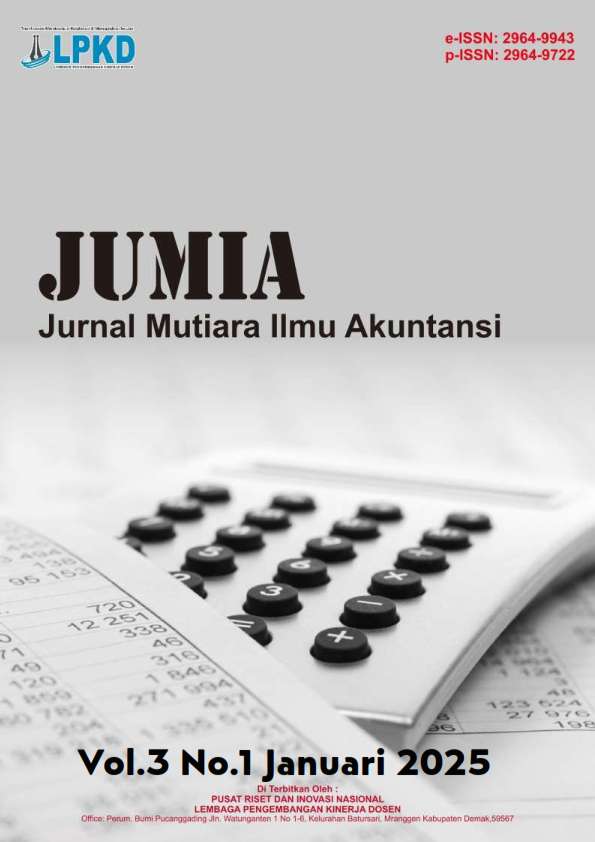Peranan Akuntansi Forensik dalam Mengungkap Gratifikasi dan Penyalahgunaan Wewenang
Studi kasus : Lembaga Pembiayaan Ekspor Indonesia dan Bandung Smart City
DOI:
https://doi.org/10.55606/jumia.v3i1.3513Keywords:
Forensic, Accounting, Gratification, Abuse, of AuthorityAbstract
This research aims to examine the role of forensic accounting in detecting and exposing acts of graft and abuse of authority, focusing on the case of the Indonesian Export Financing Agency (LPEI) and the Bandung Smart City project. Forensic accounting offers an in-depth law-based investigative approach, which enables the disclosure of patterns of financial manipulation as well as weaknesses in internal controls. This research uses a qualitative method through a literature review of relevant journals, books, and literature. The results show that forensic accounting is not only effective in uncovering financial irregularities, but also contributes to increasing transparency and accountability in the public sector. Forensic accounting has proven to be a strategic tool both in the investigation process and fraud prevention, so that it can support better state financial governance.
References
Albrecht, C., Albrecht, W., & Dunn, J. (2004). Fraud examination and prevention. South-Western: Thomson Learning.
Arianto, B. (2020). Akuntansi forensik dan fenomena korupsi politik. Journal of Social Politics and Governance (JSPG), 2(1), 47-62.
Bhasin, M. (2015). An empirical investigation of the relevant skills of forensic accountants: Experience of a developing economy. SSRN, 2676519.
Binekasri, R. (2022, December 6). Kronologi korupsi LPEI, berjamaah & rugikan negara Rp 2,6 T. CNBC Indonesia. Retrieved from https://www.cnbcindonesia.com/market/20221206072836-17-394046/kronologi-korupsi-lpei-berjamaah-rugikan-negara-rp-26-t
Komisi Pemberantasan Korupsi. (2019). Modul materi tindak pidana korupsi. Retrieved from https://aclc.kpk.go.id/wp-content/uploads/2019/07/Modul-tindak-pidana-korupsi-aclc-KPK.pdf
Naibaho, R. (2024, September 26). KPK sebut 4 tersangka kasus smart Bandung City terima Rp 1 M. Detiknews. Retrieved from https://news.detik.com/berita/d-7559950/kpk-sebut-4-tersangka-kasus-smart-bandung-city-terima-rp-1-m/amp
Olaye, C., & Olanipekun, C. (2018). Impact of forensic accounting and investigation on corporate governance in Ekiti State. Journal of Accounting, Business and Finance Research, 4(1), 28-36.
Rezaee, Z., & Riley, R. (2010). Financial statement fraud: Prevention and detection. New Jersey: John Wiley & Sons, Inc.
Sayidah, et al. (2019). Akuntansi forensik dan audit.
Simanjutak, E. (2018). Examination to determine the presence or absence of abuse of authority according to government administration law. Jurnal Hukum dan Peradilan, 7(2), 237-262.
Singleton, T., & Aaron, L. (2010). Fraud auditing and forensic accounting. Jakarta: Salemba Empat.
Tuanakotta, T. (2010). Akuntansi forensik dan audit investigatif. Jakarta: Salemba Empat.
Wells, J. (2011). Financial statement fraud casebook: Baking the ledgers and cooking the books. New York: John Wiley & Sons.








